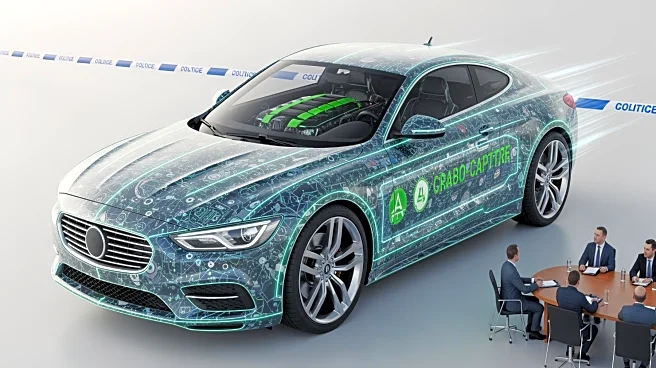What's Happening?
Mazda is advancing its efforts to make internal combustion engines more environmentally friendly by developing a 'Mobile Carbon Capture' system. This technology, showcased in the Vision X-Coupe at the Japan Mobility Show, aims to capture up to 20% of
a vehicle's exhaust gases. The system uses CO₂ adsorbents to separate carbon dioxide from exhaust gases, which is then stored and potentially used for producing recycled plastics. Mazda's approach includes using a rotary engine powered by biofuel derived from microalgae, which absorbs CO₂ during its growth. This biofuel could reduce CO₂ emissions by up to 90% compared to traditional fossil fuels. Mazda's Chief Technology Officer, Ryuichi Umeshita, suggests that combining this biofuel with the carbon-capture system could result in a net carbon-negative impact.
Why It's Important?
Mazda's initiative represents a significant step in the automotive industry's efforts to reduce carbon emissions while maintaining the use of internal combustion engines. This development could have substantial implications for the industry, offering an alternative to fully electric vehicles by potentially achieving a carbon-negative footprint. If successful, this technology could provide a transitional solution for reducing emissions, benefiting both the environment and consumers who are not ready to switch to electric vehicles. However, the scalability of biofuel production and the establishment of infrastructure for CO₂ collection and reuse remain critical challenges.
What's Next?
Mazda plans to conduct demonstration testing of its carbon-capture technology at the final round of the Super Taikyu Series. The company aims to refine the technology for practical implementation in production vehicles. The success of this initiative will depend on overcoming the challenges of biofuel production scalability and developing the necessary infrastructure for CO₂ management. Mazda's continued research and development efforts will determine the feasibility of this approach as a viable alternative to electric vehicles.
Beyond the Headlines
Mazda's approach highlights the potential for innovative solutions in reducing automotive emissions without fully transitioning to electric vehicles. This strategy could influence other automakers to explore similar technologies, potentially leading to a broader industry shift towards sustainable combustion engine solutions. The ethical and environmental implications of reducing reliance on fossil fuels while maintaining consumer choice in vehicle types could have long-term benefits for both the industry and society.
















